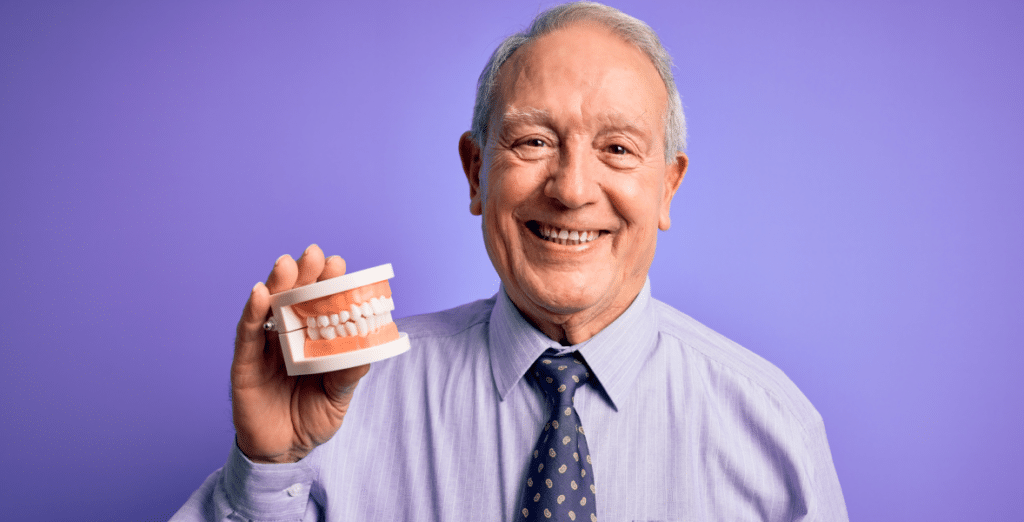This treatment is for you if…
You need to replace various teeth.
What are prostheses?
Dental prostheses are made to measure devices for the patient to restore one or various teeth and to recover their dental function and aesthetics.
They are prepared by the dental prosthesis specialist in accordance with the dentist’s instructions, since they are the only party qualified and authorised to place the apparatus on the patient. They can be made of acrylic, porcelain and other diverse materials.
What types of prostheses exist?
Based on their location in the mouth and on whether they are fixed or removable, the prostheses are classified into the following:
- Removable prostheses. They may be partial or complete.
- Fixed prostheses.
- Prostheses over dental implants. These, in turn, can be fixed or removable.
Removable prostheses
Those that can be removed by the patient to wash them. According to the number of teeth that need replacing, the removable prostheses can be partial or complete.
- Partial removable prostheses. Those used when the patient conserves any of their original teeth and the remaining ones are substituted with the prostheses. There are three types:
1. Resin prostheses. Manufactured solely with this material and supported mainly by the gums.
2. Skeletal dental prostheses. Metallic alloy structure with a combination of resin, which attaches to the gum and the adjoining teeth, through metallic hooks that transmit greater pressure on the teeth supporting them.
3 .Valplast or flexite prostheses. Made of biocompatible nylon and thermoplastic resin, they provide a degree of flexibility and ideal stability.
- Complete removable prostheses. Fitted when the patient does not conserve or cannot conserve any tooth, hence, the prosthesis substitutes all teeth in the arch. They cover the upper palate so that they are held better and occupy the whole bone crest.

Fixed prostheses over teeth
Fixed prostheses are those that cannot be removed by the patient, not even to clean them, with the dentist being the only person that can remove them. They are anchored to the teeth adjoining the missing tooth; hence they have to be previously carved to leave a space for the crown that will be subsequently placed on top of them – this is the only disadvantage.

Advantages of prostheses
The placement of prostheses to restore lost or damaged teeth has numerous aesthetic and health benefits. Some of the most notable advantages include:
- Recovering lost smile. The restoration of teeth with a prosthesis enables the patient’s smile and aesthetics to be recovered.
- Improved self-esteem. Recovering their smile usually grants more confidence to the patient, enabling them to establish enhanced social and employment relationships.
- Better chewing. On regaining teeth, the chewing function is also recovered, usually affected by damaged teeth. With correct chewing, both digestion and general health are improved.
- Prevent teeth movement. Recovering teeth closes the space that may be occupied by adjacent teeth, avoiding having to use other treatments, such as orthodontics.
- Improved pronunciation. Diction is enhanced on recovering all teeth, since tongue and mouth movements become more natural and some sounds, such as those of the letters t and d require teeth to be pronounced.
- Enhanced oral hygiene. On having all teeth, the cleaning both of the patient’s teeth and of the whole mouth will be facilitated, avoiding related problems such as halitosis.

Prostheses treatment phases
The prostheses treatment phases depend on the type of prosthesis of each patient. If using a prosthesis over dental implants, the procedure will first require a detailed study before the surgery to fit the implants. However, all of them have various phases in common.
These are the phases common to all prosthesis treatments:
1. Study of the patient. Both if the prostheses are placed on the teeth, mucosae or over an implant, the first step will always be the performance of a study by a specialist of the state of the patient’s mouth. The study will serve to check the health of the mouth and the viability of the treatment to be performed.
2. Preparation of the mouth. According to the type of prosthesis to be fitted, the preparation will be different. When the prosthesis is placed over teeth, the teeth may need to be carved for the prosthesis to be correctly fitted. When a prosthesis is placed over implants, the implant surgery has to be carried out first.
3. Preparation of new teeth at the laboratory. On most occasions, the prostheses are made by a dental prosthetist, in line with the instructions of the dentist placing them. The prostheses are usually personalised; hence the dentist must request the laboratory to make them to measure.

4. Placement of the dental prostheses. Once the mouth has been prepared, the prosthesis will be fitted. As explained in the prosthesis type section, this phase will depend on whether said prosthesis is fixed or removable, fully or partially, or whether it is placed over teeth or implants.
5. Maintenance and hygiene. For the new teeth to be conserved in a good state, it will be highly important to clean and take care of them correctly. When the prostheses are removable, they can be cleaned by the patient themselves while, if they are fixed, the specialist must clean them. In any case, it will always be very important to maintain good oral health hygiene habits.
Frequently asked questions
Dental prostheses are artificial apparatuses that replace lost teeth and surrounding tissue. There are various types, including full prostheses (to replace all teeth in a jawbone) and partial prostheses (to replace one or more missing teeth). They can be removable or fixed, such as bridges or implants.
If you have lost one or more teeth, a dental prosthesis may be an option. The choice of the type of prosthesis depends on factors, such as the amount and location of missing teeth, the general health of your mouth and your budget. A dentist will assess your needs and help you to choose the best option.
The process varies according to the type of prosthesis. It may include imprints and mouth measurements, the preparation of the remaining adjacent teeth and adjustment tests. The removable prostheses may need to be adjusted in various visits, while the fixed ones, such as implants, may require surgery and a recovery period.
The prostheses require daily care to keep them clean and in a good state. This includes brushing with a soft brush, rinsing and, in the case of removable prostheses, the use of a special cleaner. Regular trips to the dentist for adjustments and check-ups are also essential.
The cost of a dental prosthesis varies according to the case and the type of prosthesis chosen. You can consult Adeslas’s price list by clicking here.
Prices
The amounts indicated have been estimated in line with a full treatment, in accordance with the parameters in the table. Includes: study, treatment and check-ups during the treatment, so it serves as a guide and is of a merely informative non-contractual nature. The personalised treatment will be examined in line with the medical prescription. Prices can be increased if additional costs are incurred as a result of the requests made by each customer. Price valid until 31 December 2024 except in the event of a typing error.

